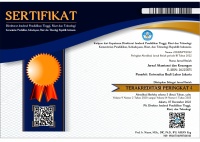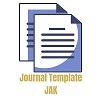Desain Akuntansi Rumah Tangga di Bulan Ramadhan
Abstract
Keywords
Full Text:
PDFReferences
Achmadi. (2008). Ideologi Pendidikan Islam: Paradigma Humanisme Teosentris. Yogyakarta: Pustaka Pelajar.
Aisyah, N. E., Desmintari, & Yetti, F. (2021). Analisis Ramadhan Effect pada Perusahaan Sub Sektor Food and Beverages yang Terdaftar di Bursa Efek Indonesia. In Konferensi Riset Nasional Ekonomi, Manajemen, dan Akuntansi (Vol. 2, pp. 1446–1456). Retrieved from https://conference.upnvj.ac.id/index.php/korelasi/article/view/1112
Alias, N., Bakar, N. A., Sadique, Ra. M., & Haron, N. H. (2019). Household Accounting: Road to Economic Resilience. The Social Science, 11(20), 4912–4917.
Ayres, L. P. (1909). Laggards in Our Schools Publications. New York: Charities Publication Committee.
Callahan, R. E. (1961). Leonard Ayres and the Educational Balance Sheet. History of Education Quarterly, 1(1), 5–13.
Habriyanto. (2019). Analisis Pola Konsumsi Pada Bulan Ramadhan ( Studi Kasus Pada Masyarakat Kota Jambi ). Universitas Islam Negeri Sumatera Utara.
Llewellyn, S., & Walker, S. P. (2000). Household Accounting As An Interface Activity : The Home, The Economy and Gender. Critical Perspective on Accounting, 11, 447–478.
Putnam, J. F. (1974). Student/Pupil Accounting: Standar Terminology and Guide for Managing Student Data in Elementary and Secondary School, Community/Junior Colleges and Adult Education. Washington: U.S. Department of Health, Education and Welfare.
Putri, A. S., & Septyan, K. (2023). Kritik Terhadap Pajak Karbon dalam Bingkai Keadilan Islam. Imanensi: Jurnal Ekonomi, Manajemen Dan Akuntansi Islam2, 8(1), 43–54. https://doi.org/10.34202/imanensi.8.1.2023.43-54
Rahmatullah, A., Mahadwartha, P. A., & Ernawati, E. (2021). The Effect of Ramadan Month on Stock Return and Volatility of a Sharia-Based Index. Journal of Entrepreneurship & Business, 2(2), 119–133. https://doi.org/10.24123/jeb.v2i2.4642
Septyan, K., & Mintoyuwono, D. (2022). Muhasabah Program Pengabdian Kepada Masyarakat Bidang Akuntansi dan Agenda Kolaborasi Ilmu Pengetahuan. Imanensi: Jurnal Ekonomi, Manajemen Dan Akuntansi Islam, 7(2), 21–38.
Setiasri, R., & Rinofah, R. (2017). Pengaruh Ramadhan Terhadap Return Dan Volume Perdagangan Saham Pada Jakarta Islamic Index (JII). Jurnal Manajemen Dewantara, 1(1), 101–109.
Syafrin, N. (2013). Konstruk Epistemologi Islam: Telaah Bidang Fiqih dan Ushul Fiqih. In A. Husaini & D. D. Kania (Eds.), Filsafat Ilmu: Perspektif Barat dan Islam2 (pp. 127–154). Jakarta: Gema Insani.
Walker, S. P., & Llewellyn, S. (2000). Accounting at Home: Some Interdisciplinary Perspectives Home. Accounting, Auditing and Accountability Journal, 13(4), 425–449. https://doi.org/http://doi.org/10.1108/09513579910270129
DOI: https://doi.org/10.36080/jak.v12i2.2235
Refbacks
- There are currently no refbacks.

This work is licensed under a Creative Commons Attribution 4.0 International License.
Fakultas Ekonomi dan Bisnis, Program Studi Akuntansi. Universitas Budi Luhur, Jl. Ciledug Raya, Petukangan Utara, Jakarta Selatan, DKI Jakarta 12260, Indonesia

This work is licensed under a Creative Commons Attribution 4.0 International License.












